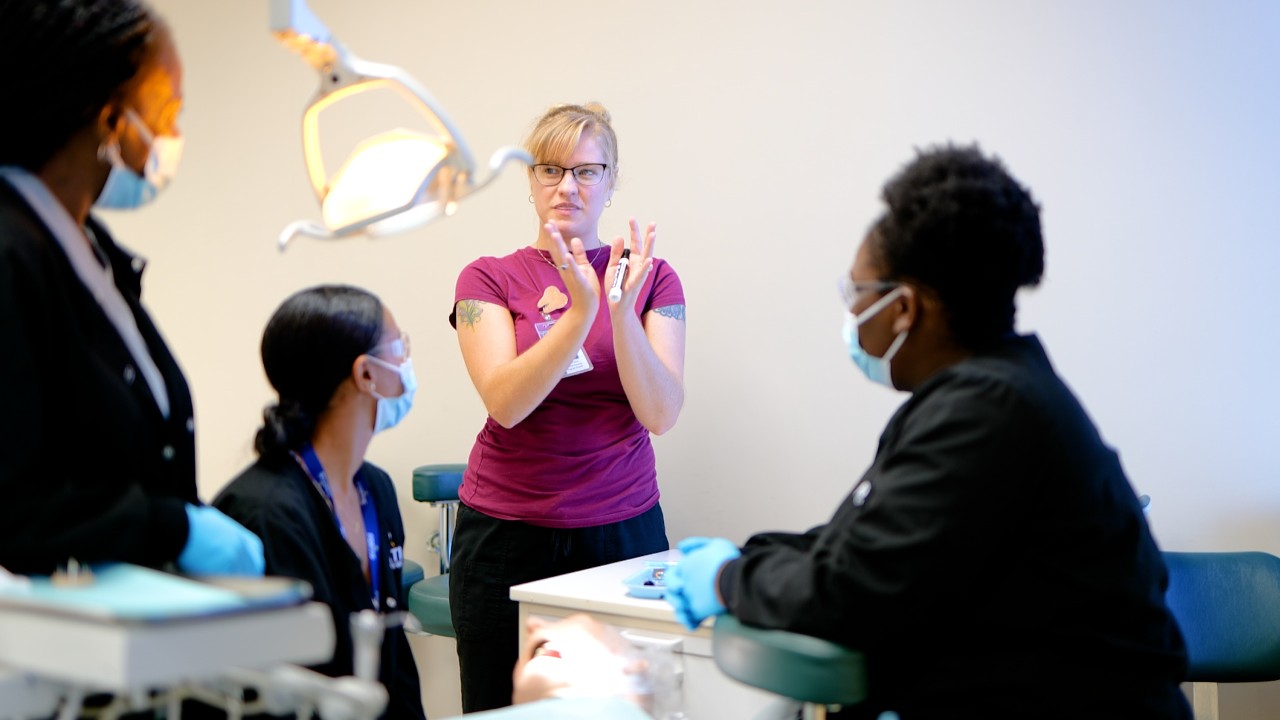Each year, millions of Americans visit the dentist’s office, where they are often greeted by dental assistants who guide them from the front desk to the dental chair. Dental assistants are crucial team players in the dental practice, preparing treatment rooms and sterilizing instruments, assisting dentists during procedures, and helping patients manage appointments and billing.
With employment opportunities for dental assistants expected to grow over the next decade, pursuing training in a dental assistant program can be a smart career move. Prospective students may wonder what benefits they can gain from the specialized training they can get at dental assistant school.
Benefits of Dental Assistant Training in Virginia
Dental assisting training programs combine classroom instruction with experiential learning to prepare students for entry-level employment in various dentistry roles. The curriculum in these programs helps students develop their knowledge and skills in several areas, including dental procedures and techniques, infection control practices, and patient care and education.
Students in a dental assistant program can realize many benefits, including those below.
Hands-On Training
A prominent feature of any dental assisting training program is that it provides students with the opportunity to apply what they have learned in the classroom in real-world situations. Through hands-on training, students develop the technical expertise and skills they will need to become practicing dental assistants. Students also participate in externships — similar to an internship, but generally much shorter — in which they observe and work alongside dental professionals in real-world settings.
Job Variety
Graduates can use their dental assisting training to pursue a range of roles.
Dental Assistant: Dental assistants have a range of clinical and administrative responsibilities, including preparing exam rooms and instruments, processing X-rays, assisting dentists with treatments, scheduling appointments, and overseeing billing.
Dental Office Manager: Dental office managers focus more on the clerical and administrative aspects of running a dental office. They are often responsible for hiring and training staff, managing patient records and billing, ensuring compliance with medical standards and regulations, and updating the practice’s computer systems.
Dental Lab Technician: Dental lab technicians primarily work in the lab, where they use impressions and molds of patients’ teeth to create and repair various dental appliances, such as dentures, crowns, and bridges.
Employment Outlook
Growing awareness of the link between oral health and overall health and the increasing dental care needs of an aging population are some factors that are likely to drive job growth for dental assistants in the coming years. Employment of dental assistants is expected to increase 8% between 2023 and 2033, creating approximately 31,500 new jobs, according to the U.S. Bureau of Labor Statistics (BLS).
In Virginia, employment growth is expected to be even more robust. Projections Central, a site sponsored by the U.S. Department of Labor (DOL), estimates that jobs for dental assistants will grow by 18% between 2022 and 2032, creating almost 1,500 net new jobs in the state. The agency projects an average of 1,360 openings each year during that period, as new dental assistants replace those who are leaving the profession.
Dental Assistant Program Requirements in Virginia
Enrolling in a dental assistant program is often much simpler than enrolling in a traditional college degree program, which generally entails submitting SAT/ACT scores, writing essays, and securing letters of recommendation.
As an example, the Fortis dental assistant schools in Virginia — which are located in Norfolk and Richmond — require applicants to:
Submit a high school diploma or an equivalent credential.
Complete an application form.
Interview with admissions staff.
Achieve a minimum threshold score on the Wonderlic Scholastic Level Exam (SLE).
Pass a criminal background check and an online competency assessment.
Additionally, because the program involves an externship component in which students interact with patients, they also need to meet certain health requirements. They need to have Basic Life Support (BLS) certification from the American Heart Association (AHA) and may need to receive certain vaccinations.
Financial Aid Available For Those Who Qualify
Students can take advantage of numerous grants, loans, and other forms of financial aid to fund their education in a dental assisting training program. A student’s eligibility for financial aid may depend on factors such as financial need, cost of attendance, or aptitude in certain subject areas. Common forms of financial aid include the following:
Pell Grant: The federal Pell Grant program is a need-based financial aid program that helps low-income students cover the cost of tuition, fees, and other educational expenses, without the need for repayment.
Federal Direct PLUS Loan: The Federal Direct PLUS Loan program enables parents of undergraduate students to borrow money to help pay for tuition, fees, housing, and food, along with other education-related expenses. Unlike the Pell Grant, PLUS loans must be repaid.
Federal Work-Study Program: The FWSP allows students who demonstrate financial need to cover some of the cost of their educational expenses by participating in community service activities or work related to their program of study.
Countless other forms of financial aid, including many private-sector grants and scholarships, are available.
Launch a Rewarding Career With Dental Assisting Training
Dental assistants are critical to ensuring that dentists’ offices run smoothly and that patients receive quality oral care. As demand for preventive dental services grows, so will the need for all types of dental professionals, including dental assistants.
In as little as 48 weeks, the Fortis dental assistant schools in Virginia can help you develop the knowledge and skills you need to enter this growing profession. We offer dental assistant programs at our campuses in Norfolk and Richmond, VA, combining classroom learning and hands-on training to give you a well-rounded experience that prepares you for a career in dental assisting.
Contact us today to learn more about the benefits of the dental assisting training program and discuss financial aid options that may be available to you.
Discover your career potential with Fortis.
Recommended Readings
What Does a Pediatric Dental Assistant Do?
Dental Hygienist vs Dental Assistant: What’s the Difference?
Beyond the Dentist’s Chair: Career Opportunities for Dental Assistants


